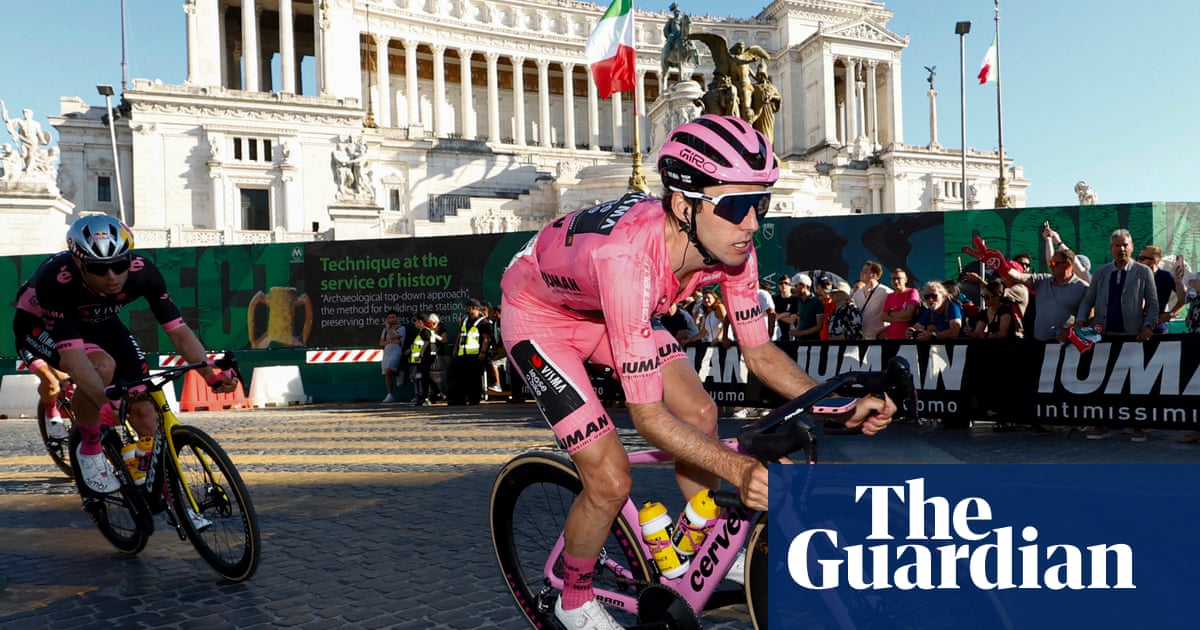Simon Yates arrived in Rome, was blessed by Pope Leo XIV and then completed a miraculous overall victory in the 2025 Giro d’Italia, seven years after his race lead had traumatically dissolved with victory in his grasp.
The Lancastrian rider’sremarkable turnaround in Saturday’s final mountain stage, in which Yates leapfrogged 21-year-old Giro debutant and race leader, Isaac del Toro and podium rival, Richard Carapaz, to take a near four-minute overall lead, was one of the most stunning in Grand Tour racing.
This was Yates’s McIlroy moment, a career catharsis that banished the pain and humiliation he had endured on the Colle delle Finestre in 2018. Seven summers after the monstrous climb cracked his career apart, the mountain that had broken him became the setting of his redemption.
As Yates, of the Visma-Lease a bike team, savoured the closing moments of the 2025 Giro, the final stage was won by his teammate Olav Kooij, who out-sprinted the Australian Kaden Groves to take their team’s third stage win of the race.
Yates is now the third British rider to win the Giro, afterChris Froome in 2018andTao Geoghegan Hart in 2020. By coincidence, the successes of all three were founded in the mountains of Piedmont.
Yates’s reversal of fortune was thanks to his own aggressive racing and the canny tactics of his team, but also to the bizarre tactical feud between Del Toro, of UAE Team Emirates, and the EF Education Easy Post leader, Carapaz, that played perfectly into his game plan.
It wasn’t quite X marks the spot, but when Yates, rose out of the saddle on the Finestre’s narrow bends, a few turns of the pedal from where Froome had dismembered his race leadership in 2018, he was evidently a man on a mission.
That year, a dominant Yates had appeared destined to win the Giro, yet endured one of the worst humiliations in the race’s history, suffering a complete collapse on the gravel hairpins of the Finestre, and finishing almost 40 minutes behind the flying Froome.
That humiliation derailed Yates, although he recovered in time to take that year’s Vuelta, his first Grand Tour success. Yet there was no real thought of settling scores with the mountain until the route of this year’scorsa rosa, climaxing with a return to the Finestre, was announced.
It was, Yates said, “in the back of my mind,” to come back to the climb that left him broken, to “close a chapter” and to show what his real capabilities were. Aided by the hard work of his teammate Wout van Aert, his redemption was writ large as he reversed his overnight deficit into a winning margin of just under four minutes.
In contrast to 2018, Yates rode discreetly throughout this year’s Giro, progressing from 21st place after the opening stage, to a holding position in the top three as he entered the Giro’s final week. When he did finally show himself on the Finestre, it was decisive.
In the end, Carapaz and Del Toro, both of whom looked capable of chasing Yates on the steep gravel slopes, found themselves caught between a rock and a hard place. Whether through hubris or tactical misjudgment, they chose to let the British rider win the Giro, rather than join forces to try to stop him.
Sign up toThe Recap
The best of our sports journalism from the past seven days and a heads-up on the weekend’s action
after newsletter promotion
Yet that view is also something of a disservice to Yates, because without him seizing the initiative with his relentless attacking, they would not have been forced to make that decision at all.
Third overall before the stage to Sestriere, Yates was also risking it all, gambling that his stamina would take him to the finish line, and that he would not be caught.
“Are they still together?” he asked anxiously on his race radio of Carapaz and Del Toro, as he climbed further ahead, through the Finestre’s final hairpins. And they were, tightly locked in a game of poker that had no winner.
Del Toro will hope that, like Yates, he one day gets another chance to claim themaglia rosaof Giro leadership. Carapaz, meanwhile, winner of the race in 2019, adds yet another top-three placing to past podium finishes in the Tour de France and Vuelta a España.
But tactical nuances are only a small part of the story and the deep, primal sobbing that poured out of the usually stoic Yates, as he collapsed into tears beyond the finish line, revealed just how personal this was for him.
Even an hour later, as he fulfilled his media duties, his eyes were still brimming. Professional cycling’s most romantic race had the most romantic conclusion. The rest was justla polemica.
